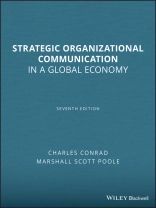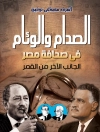Surveying a wide variety of disciplines, this fully-revised 7th edition offers a sophisticated and engaging treatment of the rapidly expanding field of organizational communication
* Places organizations and organizational communication within a broader social, economic, and cultural context
* Applies a global perspective throughout, including thoughtful consideration of non-Western forms of leadership, as well as global economic contexts
* Offers a level of sophistication and integration of ideas from a variety of disciplines that makes this treatment definitive
Updated in the seventh edition:
* Coverage of recent events and their ethical dimensions, including the bank crisis and bailouts in the US and UK
* Offers a nuanced, in-depth discussion of technology, and a new chapter on organizational change
* Includes new and revised case studies for a fresh view on perennial topics, incorporating a global focus throughout
* Online Instructors’ Manual, including sample syllabi, tips for using the case studies, test questions, and supplemental case studies
Table of Content
Unit I: Underlying Concepts.
1. Strategic Organizational Communication.
2. Keys to Strategic Organizational Communication.
Unit II: Strategies of Organizing.
3. Traditional Strategies of Organizing.
4. Relational Strategies of Organizing.
5. Cultural Strategies of Organizing.
6. Network Strategies of Organizing.
Postscript to Unit II: Contingency Perspective on Organizing Strategies.
Unit III: Challenges in the 21st Century.
7. Communication, Power, and Politics in Organizations.
8. Communication, Decision Making, and Conflict in Organizations.
9. Communication and Organizational Change.
10. Communication and Diverse Workplaces.
11. Communication, Globalization, and Organizations.
12. Communication, Ethics, and Organizational Rhetoric.
Postscript to Unit III.
Epilogue.
About the author
Charles Conrad is Professor of Organizational Communication at Texas A&M University. He has received more than a dozen college- and university-level teaching awards, including the National Communication Association’s Donald Ecroyd Award. He is the author or editor of nine books, the most recent of which are Organizational Rhetoric (2011) and Global Engineering (2010).
Marshall Scott Poole is Professor of Communication and Director of the Institute for Computing in the Humanities, Arts, and Social Science at the University of Illinois Urbana-Champaign. He has received several teaching awards and multiple research awards, including the Steven Chaffee Lifetime Productivity Award from the International Communication Association. He is the author or editor of eleven books, including Working Through Conflict (2008) and Handbook of Organizational Change and Innovation (2004).












